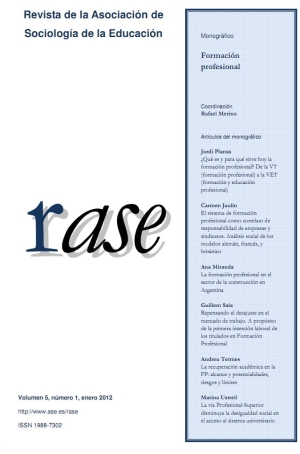La vía Profesional-Superior disminuye la desigualdad social en el acceso al sistema universitario
DOI:
https://doi.org/10.7203/RASE.5.1.8586Keywords:
Advanced Vocational Training Program, equity, University. Abstract
Abstract
Recent demographic changes and mass education have created the need to address diversity and respond to the requirements from very heterogeneous sectors. However, institutional inertia keeps progress at a slower pace than what the constantly changing social demands require. That also brings about the fact that social origin still remains a significant factor in educational achievement.
However, there are many theories which suggest that the global economy in which we are immersed demands an increase in collective educational requirements. This need for a high level of training of our human resources has been politically reflected in recent times in the EU’s Europe 2020 Strategy. This policy underlines the urgency to increase the educational level of the population, as a way to promote equity and social cohesion.
This debate is not new in the field of Sociology. There have been many studies concerning equality in education, from functionalism, based on individual deficit, and focusing on knowledge, skills and individual capacities, to the reproduction theories, which emphasize social conditions in the educational process.
In this context we will discuss access to university level studies from advanced vocational training programs. We will take, as a starting point, the hypothesis that these programs provide more opportunities for all students and, thus, they will increase the number of graduates.
 Downloads
Downloads
Downloads
Published
How to Cite
-
Abstract668
-
PDF (Español)168
Issue
Section
License
![]()
This work is licensed under a Creative Commons Reconocimiento-NoComercial-CompartirIgual 4.0 Internacional.




